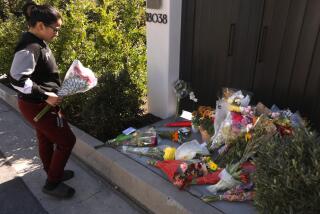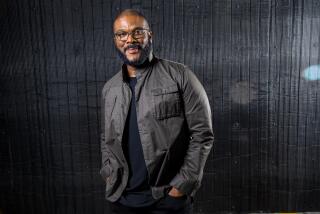How Tyler Perry’s ‘camp quarantine’ fended off the pandemic during filming of ‘Sistas’
As filmmakers prepare to resume production after months of shutdown, Tyler Perry has a message for Hollywood: Shooting during a pandemic is challenging.
The Atlanta-based producer was one of the first major filmmakers to power back up production in the wake of the coronavirus health crisis.
He recently wrapped two weeks of filming for the second season of “Sistas,” a BET Networks show about the lives of four single Black women.
At his so-called “camp quarantine,” Perry implemented a 30-page list of conditions including frequent testing and sequestering cast and crew for “Sistas” at his sprawling Atlanta studio, which is on the site of a former army base.
So how did he fare? Perry said his experience was successful and that there was no COVID-19 outbreak during production. But he had to go to great lengths to make that possible — and there were hurdles along the way.
Even with extensive safety precautions, several crew members contracted the coronavirus during preproduction. In the weeks before filming on the quarantined set, a few cases among the crew showed up during the testing process conducted every four days. And there were also delays in getting test results in a timely fashion, Perry said.
“To be honest with you, I don’t know how it’s done safely unless you’re quarantined or you’re testing every day,” said Perry, creator of the “Madea” films.
Virus testing and other challenges are complicating efforts to resume production four months after the COVID-19 pandemic halted film and TV shoots.
Perry was well aware of the risks. Before production restarted, COVID-19 had claimed the life of Emmy-nominated hair stylist Charles Gregory Ross, a crew member he had worked with for many years.
In a tribute to Ross, Perry praised his colleague and noted how the disease disproportionately affects the Black community.
In Southern California, many major film productions are still working to relaunch production after almost all filming was shut down since the pandemic outbreak in March. Unions and producers have been working with health officials to formulate detailed guidelines for safe filming on sets without risking new outbreaks.
Most of the filming that has resumed in L.A. County has been smaller commercial and music shoots. The threat of a second wave has given some producers renewed pause.
Perry’s experience is being closely watched for how safely crew members can work together in jobs in which social distancing is often hard to implement.
Under the rules set by the major Hollywood unions and studio producers, crew are tested weekly or every three days if unable to socially distance. But Perry’s protocols went even further.
“Everything in the plan, we followed it to the letter and it worked,” Perry said.
Cast and crew were tested two weeks before flying by private plane to the set, and then again on landing in Atlanta, and then sequestered in private rooms until the results came back.
Some of the cast and crew tested positive on arrival to set and were sent for medical attention. They didn’t come into contact with others and remained in their rooms until results came back. Masks and social distancing were observed on set during filming and there were no positive tests during the shoot. Crew were not allowed to leave for 14 days and were tested every four days.
Like other productions, Perry said testing had its challenges.
“The most important day that we needed the test back right away was delayed about by almost two days, because of just the backlog of people having COVID tests, which I completely understand,” said Perry.
One takeaway for Perry was how effective masks can be at preventing the spread of the virus. A driver became infected with the disease but none of the crew members who drove around with him in a car got sick because all had been wearing masks, he said.
“We traced all the people that were in the car with that person. ... Everybody in the car wore masks and did the right thing, and none of those people were positive,” Perry said.
While nasal swabs are the most reliable method of testing, they can be uncomfortable, so the crew shifted to tonsil swabs instead. If they had insisted on nasal swab testing every four days, “A lot of people would have tapped out,” he said.
Some cast and crew with whom Perry has worked had preexisting conditions such as cancer and did not want to work, Perry said.
“I said to them, ‘Listen, if you have preexisting conditions, it’s OK to sit this out,’” he said. “I was the most concerned about them. But I’m so glad that my crew did above and beyond to make sure everybody was safe.”
Perry is now pressing ahead with his next shoot. He finished shooting “Sistas” on Saturday and the production will take a week off to clean and sterilize the housing to get ready for the next group.
On Thursday the process will start again for his production of another season of BET’s “The Oval.” In the dramatic TV series about a family in the White House. Perry said shooting will start again on Monday following the same protocols.
“I’m hoping that there’s a vaccine soon so we can all make it through this,” he said.
More to Read
Inside the business of entertainment
The Wide Shot brings you news, analysis and insights on everything from streaming wars to production — and what it all means for the future.
You may occasionally receive promotional content from the Los Angeles Times.











